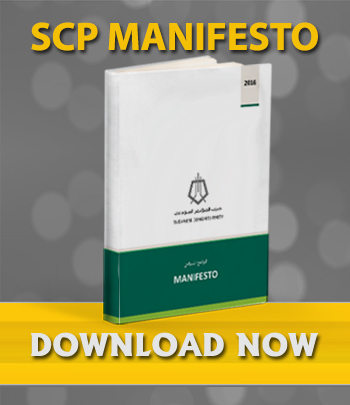THE STATE SYSTEM
5.1 System of Government
Applying basic principles to the current Sudanese situation through the adoption of a democratic, pluralistic and decentralized civil system of government, one that concentrates its political activity through exercising the principle of the separation of powers where the parliament is formed through free and fair elections within the context of a pluralistic democracy and through legislation and oversight of the executive branch. The elected government will in the same way be responsible for its implementation, while the judiciary shall be independent to protect the constitution and to settle disputes. It is also necessary to provide for fair competition in order to ensure that the elections are carried out in accordance with clear laws which are committed to the equitable distribution of the geographical constituencies according to the density of the population.
Therefore, the state structure adopted by the Sudanese Congress Party consists of:
5.2 Head of State:
Who is the President of the Republic, elected directly by the people, a symbol of sovereignty, supreme commander of the armed forces, and the head of the executive branch. Arranging for general elections throughout the country every five years, and to adhere to the highest standards of transparency and integrity. No person has the right to hold the post of President of the Republic for more than two electoral terms.
5.2.1 Council of Ministers:
The President of the Republic shall appoint a Prime Minister, who in turn shall form their government, which shall be approved by the Federal Parliament. The Council shall be accountable to the Parliament which shall be able to withdraw confidence from him/her in case of failure to carry out their duties in accordance with the democratic regulations specified by the Parliament.
5.2.2 The Federal Parliament:
● The federal legislative authority is composed of a federal parliament that is democratically elected by fair
representation from the different regions.
● The Federal Parliament shall carry out the functions of legislation, the formulation of public policies and the monitoring
of the performance of the various entities.
● The federal Executive bodies shall be responsible for implementing specific policies and programmes approved by the
Federal Parliament and subject to its accountability and oversight.
● The federal Parliament shall have the right to form any bodies it deems necessary for the exercise of its functions in
legislation, oversight and accountability.
● The federal Parliament shall be an independent body to monitor and raise awareness of human rights issues.
● The federal Parliament oversees the formation of national councils specializing in various professional and technical
fields concerned with the development of studies, plans and scientific programs.
● The federal Parliament shall be solely responsible for independent national bodies in order to ensure their
establishment, independence and impartiality, such as the civil service, the judiciary, the uniformed forces, universities,
scientific research centres, the central Bank and the Specialized Council.
● The Federal Parliament establishes a democratic electoral law that follows the principle of proportional representation
with a percentage of seats reserved for women.
5.2.3 Regional authority:
The country is divided into six regions: Northern / Khartoum / Eastern / Central / Kordofan / Darfur. At the head of each region is a Governor elected by the population in the region. Regional governments are formed in each region. It also strengthens the authorities of the region with all the controls and laws that secure the necessary resources for their territories. These resources are protected by a commission for the distribution of revenues on a fair basis. This Commission is not subordinate to the federal authority but is independent so as to enable it to fully exercise its functions.
● Each region consists of an appropriate number of administrative units (governorates-civil and rural councils,
localities... etc.)
● In each region, a parliament is formed through free democratic elections in the popular localities, civil, rural and
provincial councils.
● The Parliament ratifies the Regional Government proposed by the elected government of the region and is
accountable to it for the performance of the executive functions approved by the regional Parliament and is
entitled to hold it accountable and to change it in accordance with the regulations and democratic systems
authorized by the regional parliament.
5.3 The Constitution:
The Constitution is the supreme law of the country, it governs all levels of government, and its provisions are binding on the institutions of the national and regional states, overseen by the judiciary that monitors its application and compliance with it and it is installed through a democratic process that ensures the participation of all citizens of the country and the incorporation of different opinions and views in all the stages of its creation and final delivery through a free and fair popular referendum that does not contravene any article of the universal human rights principles which are guaranteed in the country's constitution and are an integral part thereof.
5.3.1 Contents and inclusions within the Constitution:
The Constitution contains the following:
1. Decentralized system of government.
2. Separation of the three legislative, executive and judicial branches
3. Financial revenues.
4. National and regional authorities.
5. Human rights, freedoms and guarantees.
5.3.2 Constitution drafting procedures:
1. A constitutional national conference in which political forces and civil society participate.
2. Drafting Committee.
3. Presenting the draft to the political forces and civil society.
4. The popular referendum.
5.4 Judiciary:
Is the competent authority to adjudicate disputes in accordance with the Constitution and the law, to protect the Constitution, and to refrain from applying any law contrary to or in conflict with its provisions. The judiciary is an independent authority from the legislative and executive branches, and its establishment and independence is guaranteed by law.
5.5 Public Prosecutor’s Office:
The Public prosecutor's Office is a quasi-judicial justice organ, acting on behalf of the State and prosecuting in its name, it represents the community in the courts against criminals and suspects, it is an independent, national body and works to ensure the independence, integrity and efficiency of the public Prosecution Service.
5.6 Legal Services Commission:
It supervises and ensures the importance of the role of the legal profession in the promotion of justice and guarantees this profession respect and independence to enable it to function.


